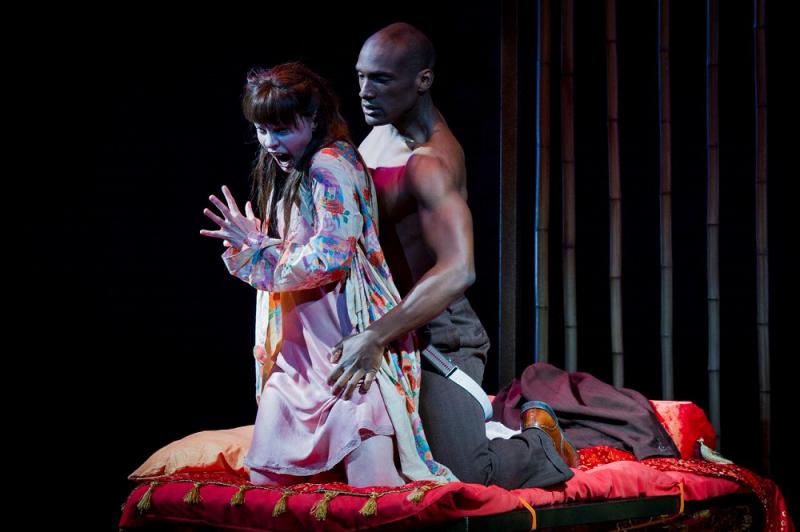 United Kingdom Mascagni, Iris (sung in Italian): Soloists, Holland Park Opera Chorus, City of London Sinfonia/Stuart Stratford (conductor), Opera Holland Park, London, 7.6.2016. (CC)
United Kingdom Mascagni, Iris (sung in Italian): Soloists, Holland Park Opera Chorus, City of London Sinfonia/Stuart Stratford (conductor), Opera Holland Park, London, 7.6.2016. (CC)

Mascagni, Iris
Cast:
Iris: Anne Sophie Duprels
Osaka: Noah Stewart
I’ll Cisco: Mikhail Svetlov
Kyoto: James Cleverton
Geisha: Johane Ansell
Un Merciaiuolo: Michael Bradley
Un Cenciaiuolo: Timothy Langston
Un Cenciaiuolo: Alistair Sutherland
Un Cenciaiuolo: Freddie De Tommaso
Alex Cuadros Joglar, Joshua Junker, Amelia Townsend, Dancers
Production:
Director: Olivia Fuchs
Designer: Soutta Gilmour
Lighting Designer: Mark Jonathan
Choreographer: Charlotte Edmonds
Movement Director: Namiko Gahier-Ogawa
Chorus Master: Nicholas Jenkins
This is precisely the sort of thing at which Opera Holland Park excels, and it did not disappoint one jot. Little-known verismo opera such as Iris often contains jewel upon jewel, and the one thing that continues to resonate after the first performance of this run of Iris is the sustained quality of the score – that and Anne Sophie Dupreis’ masterful, stunning assumption of the title role. It is not a short opera, the three acts are a little unbalanced (the second is positively Wagnerian in length; the final one gives us the climax somewhat more pithily).
Inspired by the trend of Orientalism, and specifically japonoiserie, the story (with libretto by a certain Illica) implies a pre-echo of Puccini in Madama Butterfly mode. Yet Mascagni’s use of orientalist colourings is less pronounced, limited to a few well placed instances. His soaring melodies speak of his Italian roots. The stage implied a Japanese setting, with its stylised lotus flowers; cutting against this perhaps were the western suits of the manipulatory Osaka and Kyoto (how fitting though that a mere stone’s throw away is Holland Park’s own Kyoto Garden!). Cages with bamboo bars were multi-functional, from bedroom (Act 2) to separating/isolating spaces between three characters in the final act as each delivered his valedictory statements. The work is bookended by Choruses to the Sun, delivered with blinding force here by the Chorus of Opera Holland Park (all credit to Chorus Master Nicholas Jenkins).
The story pulls no punches and centres firmly on the titular heroine, Iris, an innocent girl devoted to her blind father, who in turn depends on her to be his eyes. She plays with her dolls, dreams of monsters, and is cruelly abducted whilst in the process of being absolutely transfixed by a puppet show, a show put on for the sole purpose of that abduction. During the show, the curious figures of Death, Beauty and a Vampire entertain the crowds. Iris’s father is left to believe that her disappearance was a deliberate ploy. This misunderstanding between father and daughter is crucial to the unraveling of the storyline, for when they do find each other, he rejects her, and Iris is left to die after a suicide attempt in the sewers. As she dies, commenting on the futility of her own existence, it is the rising sun that brings her solace.
So it’s not a comedy. It is, however, remarkably wide-ranging in its emotional scope, as is the part of Iris itself. Anne Sophie Duprels is simply stunning in all respects; in stature, she is the perfect size to suggest the fragility of the heroine; her voice has all the range and strength Mascagni requires. Her way with Mascagni’s ever-expressive lines as she sings to her dolls revealed someone completely at home in this repertoire. Her ‘commentary’ on the staged entertainment was beautifully convincing, as was her sense of confusion, a sense of a girl experiencing something way above her head, in the Act Two seduction. The climax, her own death scene, was magnificently managed, vocally and dramatically – a true partnership between herself and orchestra.
As her father, Mikhail Svetlov (who has previously taken the part of Archiboldo in L’amore di tre re in both 2007 and 2015), had all the requisite gravitas in both stage presence and vocal heft, his voice lovely and resonant. Rather less successful, at least initially, was the Osaka of Noah Stewart, who took time to warm into his role. Although the seduction scene of the second act held more confidence (perhaps he was aware the effect that the removal of his shirt might have on the lady audience members of Holland Park), his acting never quite got there. James Cleverton was a solid Kyoto; Johane Ansell a fine Geisha.
Stuart Stratford brought out the very best of the City of London Sinfonia, with the exception of the horns, who seemed to be having something of an off night (particularly the principal). That aside, the drama was beautifully and relentlessly tracked, and Mascagni’s lines were given every opportunity to soar. The sound of the orchestra, too, came across as more rounded than I remember it from previous years. One of the most memorable moments was the opening of the final act, which palpably invoked an analagous desolation to that of the final act of Puccini’s Bohème; another was at the discovery of the ‘body’ towards the end, the orchestral tone positively sepulchral.
The Chorus was magnificent, and not just in those sun choruses. As a chorus of leeches in the central act, the males really relished their moment. But it is Mascagni’s score that was the hero of the hour, from its arresting opening (solo double-bass) through its several instances of gossamer split strings (where the writing of Richard Strauss sprang to mind), to the blazing choruses and the superb scoring supporting those soaring vocal lines.
Choreography for the dance sections was expertly managed by Charlotte Edwards, the first participant of The Royal Ballet Young Choreographer Programme. All in all, this was a remarkable evening: Iris awaits your discovery.
Colin Clarke
